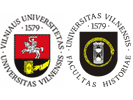The purpose of this article is to compare the E. Gudavičius’ conception of feudalism with the Russian orientalist’s L. Vasilyev’s attitude to this issue. Both historians treat themselves as Marxists (in the Western meaning of it, i. e. supporters of the Asian mode of production). Consequently their views to the development of the history of mankind are similar but not equal. In this article feudalism is treated as a historical and socioeconomic formation and some stage of human development during which the feudal mode of production was dominating.
L. Vasilyev describes the stage of feudalism in Western Europe as the age of orientalisation of social structure, i. e. as a regress. Only the rebirth of the Antiquity bore capitalism. E. Gudavičius stresses that feudalism created a individual producer (peasant) farm and consequently it was an essential progress in the social development of the societies of Western | 

 dizainas ir programavimas giriaus
dizainas ir programavimas giriaus  dizainas ir programavimas giriaus
dizainas ir programavimas giriaus